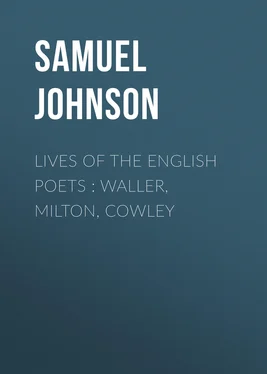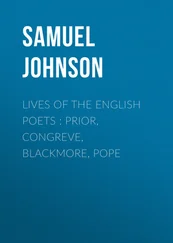Samuel Johnson - Lives of the English Poets - Waller, Milton, Cowley
Здесь есть возможность читать онлайн «Samuel Johnson - Lives of the English Poets - Waller, Milton, Cowley» — ознакомительный отрывок электронной книги совершенно бесплатно, а после прочтения отрывка купить полную версию. В некоторых случаях можно слушать аудио, скачать через торрент в формате fb2 и присутствует краткое содержание. Жанр: Биографии и Мемуары, literature_19, Поэзия, foreign_antique, foreign_prose, foreign_poetry, на английском языке. Описание произведения, (предисловие) а так же отзывы посетителей доступны на портале библиотеки ЛибКат.
- Название:Lives of the English Poets : Waller, Milton, Cowley
- Автор:
- Жанр:
- Год:неизвестен
- ISBN:нет данных
- Рейтинг книги:3 / 5. Голосов: 1
-
Избранное:Добавить в избранное
- Отзывы:
-
Ваша оценка:
- 60
- 1
- 2
- 3
- 4
- 5
Lives of the English Poets : Waller, Milton, Cowley: краткое содержание, описание и аннотация
Предлагаем к чтению аннотацию, описание, краткое содержание или предисловие (зависит от того, что написал сам автор книги «Lives of the English Poets : Waller, Milton, Cowley»). Если вы не нашли необходимую информацию о книге — напишите в комментариях, мы постараемся отыскать её.
Lives of the English Poets : Waller, Milton, Cowley — читать онлайн ознакомительный отрывок
Ниже представлен текст книги, разбитый по страницам. Система сохранения места последней прочитанной страницы, позволяет с удобством читать онлайн бесплатно книгу «Lives of the English Poets : Waller, Milton, Cowley», без необходимости каждый раз заново искать на чём Вы остановились. Поставьте закладку, и сможете в любой момент перейти на страницу, на которой закончили чтение.
Интервал:
Закладка:
Samuel Johnson
Lives of the English Poets : Waller, Milton, Cowley
INTRODUCTION
Samuel Johnson, born at Lichfield in the year 1709, on the 7th of September Old Style, 18th New Style, was sixty-eight years old when he agreed with the booksellers to write his “Lives of the English Poets.” “I am engaged,” he said, “to write little Lives, and little Prefaces, to a little edition of the English Poets.” His conscience was also a little hurt by the fact that the bargain was made on Easter Eve. In 1777 his memorandum, set down among prayers and meditations, was “29 March, Easter Eve, I treated with booksellers on a bargain, but the time was not long.”
The history of the book as told to Boswell by Edward Dilly, one of the contracting booksellers, was this. An edition of Poets printed by the Martins in Edinburgh, and sold by Bell in London, was regarded by the London publishers as an interference with the honorary copyright which booksellers then respected among themselves. They said also that it was inaccurately printed and its type was small. A few booksellers agreed, therefore, among themselves to call a meeting of proprietors of honorary or actual copyright in the various Poets. In Poets who had died before 1660 they had no trade interest at all. About forty of the most respectable booksellers in London accepted the invitation to this meeting. They determined to proceed immediately with an elegant and uniform edition of Poets in whose works they were interested, and they deputed three of their number, William Strahan, Thomas Davies, and Cadell, to wait on Johnson, asking him to write the series of prefatory Lives, and name his own terms. Johnson agreed at once, and suggested as his price two hundred guineas, when, as Malone says, the booksellers would readily have given him a thousand. He then contemplated only “little Lives.” His energetic pleasure in the work expanded his Preface beyond the limits of the first design; but when it was observed to Johnson that he was underpaid by the booksellers, his reply was, “No, sir; it was not that they gave me too little, but that I gave them too much.” He gave them, in fact, his masterpiece. His keen interest in Literature as the soul of life, his sympathetic insight into human nature, enabled him to put all that was best in himself into these studies of the lives of men for whom he cared, and of the books that he was glad to speak his mind about in his own shrewd independent way. Boswell was somewhat disappointed at finding that the selection of the Poets in this series would not be Johnson’s, but that he was to furnish a Preface and Life to any Poet the booksellers pleased. “I asked him,” writes Boswell, “if he would do this to any dunce’s works, if they should ask him.” Johnson. “Yes, sir; and say he was a dunce.”
The meeting of booksellers, happy in the support of Johnson’s intellectual power, appointed also a committee to engage the best engravers, and another committee to give directions about paper and printing. They made out at once a list of the Poets they meant to give, “many of which,” said Dilly, “are within the time of the Act of Queen Anne, which Martin and Bell cannot give, as they have no property in them. The proprietors are almost all the booksellers in London, of consequence.”
In 1780 the booksellers published, in separate form, four volumes of Johnson’s “Prefaces, Biographical and Critical, to the most Eminent of the English Poets.” The completion followed in 1781. “Sometime in March,” Johnson writes in that year, “I finished the Lives of the Poets.” The series of books to which they actually served as prefaces extended to sixty volumes. When his work was done, Johnson then being in his seventy-second year, the booksellers added £100 to the price first asked. Johnson’s own life was then near its close. He died on the 13th of December, 1784, aged seventy-five.
Of the Lives in this collection, Johnson himself liked best his Life of Cowley, for the thoroughness with which he had examined in it the style of what he called the metaphysical Poets. In his Life of Milton, the sense of Milton’s genius is not less evident than the difference in point of view which made it difficult for Johnson to know Milton thoroughly. They know each other now. For Johnson sought as steadily as Milton to do all as “in his great Taskmaster’s eye.”
H. M.WALLER
Edmund Waller was born on the third of March, 1605, at Coleshill, in Hertfordshire. His father was Robert Waller, Esquire, of Agmondesham, in Buckinghamshire, whose family was originally a branch of the Kentish Wallers; and his mother was the daughter of John Hampden, of Hampden, in the same county, and sister to Hampden, the zealot of rebellion.
His father died while he was yet an infant, but left him a yearly income of three thousand five hundred pounds; which, rating together the value of money and the customs of life, we may reckon more than equivalent to ten thousand at the present time.
He was educated, by the care of his mother, at Eton; and removed afterwards to King’s College, in Cambridge. He was sent to Parliament in his eighteenth, if not in his sixteenth year, and frequented the court of James the First, where he heard a very remarkable conversation, which the writer of the Life prefixed to his Works, who seems to have been well informed of facts, though he may sometimes err in chronology, has delivered as indubitably certain:
“He found Dr. Andrews, Bishop of Winchester, and Dr. Neale, Bishop of Durham, standing behind his Majesty’s chair; and there happened something extraordinary,” continues this writer, “in the conversation those prelates had with the king, on which Mr. Waller did often reflect. His Majesty asked the bishops, ‘My Lords, cannot I take my subject’s money, when I want it, without all this formality of Parliament?’ The Bishop of Durham readily answered, ‘God forbid, Sir, but you should: you are the breath of our nostrils.’ Whereupon the king turned and said to the Bishop of Winchester, ‘Well, my Lord, what say you?’ ‘Sir,’ replied the bishop, ‘I have no skill to judge of Parliamentary cases. The king answered, ‘No put-offs, my Lord; answer me presently.’ ‘Then, Sir,’ said he, ‘I think it is lawful for you to take my brother Neale’s money; for he offers it.’ Mr. Waller said the company was pleased with this answer, and the wit of it seemed to affect the king; for a certain lord coming in soon after, his Majesty cried out, ‘Oh, my lord, they say you lig with my Lady.’ ‘No, Sir,’ says his lordship in confusion; ‘but I like her company, because she has so much wit.’ ‘Why, then,’ says the king, ‘do you not lig with my Lord of Winchester there?’”
Waller’s political and poetical life began nearly together. In his eighteenth year he wrote the poem that appears first in his works, on “The Prince’s Escape at St. Andero:” a piece which justifies the observation made by one of his editors, that he attained, by a felicity like instinct, a style which perhaps will never be obsolete; and that “were we to judge only by the wording, we could not know what was wrote at twenty, and what at’ fourscore.” His versification was, in his first essay, such as it appears in his last performance. By the perusal of Fairfax’s translation of Tasso, to which, as Dryden relates, he confessed himself indebted for the smoothness of his numbers, and by his own nicety of observation, he had already formed such a system of metrical harmony as he never afterwards much needed, or much endeavoured, to improve. Denham corrected his numbers by experience, and gained ground gradually upon the ruggedness of his age; but what was acquired by Denham was inherited by Waller.
Читать дальшеИнтервал:
Закладка:
Похожие книги на «Lives of the English Poets : Waller, Milton, Cowley»
Представляем Вашему вниманию похожие книги на «Lives of the English Poets : Waller, Milton, Cowley» списком для выбора. Мы отобрали схожую по названию и смыслу литературу в надежде предоставить читателям больше вариантов отыскать новые, интересные, ещё непрочитанные произведения.
Обсуждение, отзывы о книге «Lives of the English Poets : Waller, Milton, Cowley» и просто собственные мнения читателей. Оставьте ваши комментарии, напишите, что Вы думаете о произведении, его смысле или главных героях. Укажите что конкретно понравилось, а что нет, и почему Вы так считаете.












